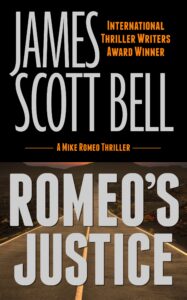by James Scott Bell
@jamesscottbell
 The news is obviously a great place to find plot ideas. I used to clip news items from actual newspapers and toss them in an “idea box.” When getting ready to develop a new novel, I’d go through the box looking for something that still grabbed me and could be the basis of a story, or at least provide an interesting subplot.
The news is obviously a great place to find plot ideas. I used to clip news items from actual newspapers and toss them in an “idea box.” When getting ready to develop a new novel, I’d go through the box looking for something that still grabbed me and could be the basis of a story, or at least provide an interesting subplot.
An example is my latest Mike Romeo thriller, Romeo’s Justice (which, as it happens, launches today, at the deal price of just $1.99. What a coincidence!)
For Romeo’s Justice I riffed off a story I read about the mining of lithium in California’s Salton Sea. That’s obviously timely, as electric vehicles (EVs) are being…encouraged…and lithium—lots and lots of lithium—is needed for manufacturing EV batteries. Thus, there is a rush for “white gold” and the Salton Sea is the new Sutter’s Mill. This provided both a setting and a subplot for my novel.
That’s one way to use the news—find an issue of current moment and either weave it into the narrative or make it the foundation for the main plot. Goodness knows, there are plenty of issues to choose from these days, but a word of caution is in order. A novel is not a sermon, extended rant, or thinly-disguised jeremiad. It is not 80k words worth of Twitterspeak (or should I say Xtalk?).
You’ve got to play fair with the characters. You have a strong opinion, fine, but make sure it is dramatized and not hammered. Give characters with the opposing view a justification (even if it’s just in their own minds) for what they are doing. Otherwise, a good portion of your potential readership will likely skip your other books. If they want to get yelled at they can doomscroll on X for free.
There’s another way to use headline ripping, and that’s taking an actual event and using it as the main plot. Now you’re dealing with real people, and the primary caution here is defamation.
Now, libel cases are notoriously difficult to sustain, especially in the fiction context. Though not impossible. There was the case some years ago of a novel called The Red Hat Club in which the author based a character on her (former) friend. The character in the novel is “an out-of-control alcoholic, who drinks during flights. She has sex with ‘stud puppies’ and married men, dresses provocatively, acts rude and crude, and is labeled as a ‘right wing reactionary’ and atheist with an awful temper.”
The ex-friend was not happy about this. She sued, and since she was not a “public figure” (thus bearing a more favorable burden of proof) she won.

Blue-footed booby
And so, while libel cases against novelists are as rare as the blue-footed booby, there are a few simple things you should do just to be safe.
Of course, put in the standard disclaimer: This is a work of fiction. Any resemblance to actual persons, living or dead, is purely coincidental.
But also change key facts. For example, if the real person is a man, consider making the character a woman. If he’s a lawyer, you could make him an investment banker. If the event happened in New York, set it in Los Angeles.
At the very least, change the name, for goodness’ sake. The TV show Law & Order uses real events all the time. They always run their disclaimer, then usually do an episode based on a real crime. They change things around, but one time they got lazy. In a story with the headline Was a Law & Order Episode Ripped Too Closely From the Headlines? the Hollywood Reporter documented an episode where a Brooklyn Supreme Court judge accepts cash bribes from a bald, Indian-American lawyer named Ravi Patel.
A bald, Indian-American lawyer named Ravi Batra sued the show’s creator, Dick Wolf. “In real life, Batra had close connections with a New York politician who allegedly accepted bribes and was said to have influence over a a Brooklyn Supreme Court judge.”
Defendant Wolf moved for summary judgment (a dismissal of the suit as a matter of law). But a judge denied the motion, holding that there was “a reasonable likelihood that the ordinary viewer, unacquainted with Batra personally, could understand Patel’s corruption to be the truth about Batra.”
I don’t know what ultimately happened to the case; I suspect it was settled shortly after this. But the show could easily have changed the first name of the character. Or made him a Greek-American named Xander Papadopoulos. It was careless not to.
So remember the two Ds when riffing from headlines: Disclaimer and Differences. Do that and you’re golden. (Memoir writing is another kettle of carp. See this article over on Jane Friedman’s site.)
Speaking of headlines, I can’t resist sharing a few of my favorites, gathered over the years. These are real:
Milk Drinkers Turn to Powder
Iraqi Head Seeks Arms
Something Went Wrong in Jet Crash, Experts Say
Include Your Children When Baking Cookies
Squad Helps Dog Bite Victim
Red Tape Holds Up New Bridge
Juvenile Court to Try Shooting Defendant
Complaints About NBA Referees Turning Ugly
Do you use the news for inspiration? Or just frustration?
And don’t forget:

